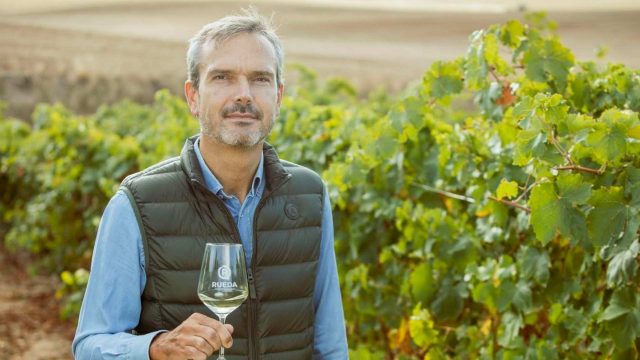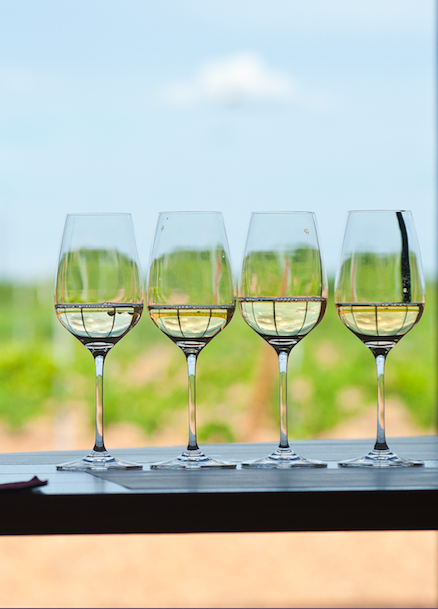This website uses cookies so that we can provide you with the best user experience possible. Cookie information is stored in your browser and performs functions such as recognising you when you return to our website and helping our team to understand which sections of the website you find most interesting and useful.
db Meets: Santiago Mora of DO Rueda
The director of DO Rueda on the 2021 harvest, how Rueda is tackling climate change, and the rise of long-aged, gastronomic whites from the region.

How is the 2021 vintage in Rueda shaping up?
The 2021 vintage finished with a total of 124,534,401 kilos harvested. The grapes were very healthy, which will lead to wines with good structure and an excellent flavour profile. The harvest started on 27 August with Sauvignon Blanc, followed by Verdejo a week later. When picking the grapes, we were looking for the best balance of alcohol and acidity. The harvest was blessed with good weather apart from two incidents of rain. The fruit quality is very good and the wines that are fermenting are showing great intensity with a better mouthfeel and structure than in recent years. This year has combined a great harvest with good quantities, when we were expecting some shortages from the larger producers.
What are the biggest trends in Rueda right now?
In Rueda the trend is towards provenance and quality, as we see with the Grandes Vinos de Rueda. These wines are produced in vineyards that are than 30 years old and with a yield of less than 6.500 kg/ha. The coversion rate of must to every kilo of grapes has to be less than 65%, using only the very best free run juice to make these wines. This, together with versatility and potential of the Verdejo variety to produce wines that can age, means that more ‘crianza’ wines are being produced that are suited to gastronomy and appeal to connoisseurs.
How are Rueda exports faring at the moment?
Over 87% of the wines made in DO Rueda are produced from the native Verdejo grape. This is, without doubt, the star of the region, and the young, fresh, unoaked wines are the most popular wines in Spain, which represents around 85% of the market for the DO. Our aim is to position DO Rueda as the leader in quality white wines in Spain, with more that 40% of the market share. In terms of export markets, the Netherlands, Germany, US, Russia and Switzerland are our most important, alongside the UK. They are all markets that appreciate well made white wines with a good price to quality ratio. This year exports grew at a rate of 9.4% to 9.4 million bottles in the first quarter – a record for the region.

How is the Rueda region tackling climate change?
The vegetative cycle in Rueda is beginning to shorten. Our principle variety is adapting well to the climatic challenges affecting the region, where we have always had to deal with a continental climate, very dry, hot summers and long, cold winters. The vineyard altitude, between 700 and 900 metres above sea level, together with big diurnal temperature differences, means our wines have great expression and freshness, despite possible climate change. The CRDO Rueda has made an important investment in weather stations, installing 36 across the region to help producers track weather patterns.
Have you noticed a change in consumer buyer habits since the pandemic?
Since the pandemic, Rueda wines have been consumed in our principle markets. In other markets sales have remained stable and the price spent per bottle has increased, as more quality wine is being purchased. The pandemic has created new consumption occasions, such as at-home consumption, which is on the rise.
Are Rueda producers taking any big steps into e-commerce?
This has been fundamental pillar for DO Rueda wineries recently. Wineries have been forced into changing their sales and distribution strategies, making their way onto supermarket shelves and specialist shops, as well as positioning their products with online retailers and launching their own direct to consumer sites. This rapid reaction to adapt to the circumstances has meant that the sales losses for DO Rueda in 2020 has been limited to 10% – an impressive figure given the situation.

What investments are going on in Rueda at the moment?
The investment in Rueda by wineries from all over Spain has and continues to be very important. Rueda is the Spanish white wine ‘par excellence’, and this translates into considerable interest in our region from wineries across Spain. Local producers continue to invest in technology and research, as well as committing to organic and sustainable cultivation methods.
Are you working on any exciting wine tourism projects in Rueda?
Producers have reopened their bodegas to welcome tourists, taking advantage of the fact that the region is situated on one of the main corridors that links Madrid with the north and north-west of Spain. Rueda has positioned itself as a major operator in the wine tourism sector, and is benefitting from the rise in rural tourism in Spain. We continue to support the Rueda Wine Route, as its founders.
How about new product releases?
Our Gran Vino de Rueda project continues to be a priority, which is now in its second year, with more wineries joining the category. The wines in this category are destined for ageing (vinos de guarda), and have to have a minimum of one year’s ageing from harvest. As a result, they are made and marketed differently. Throughout 2022 we will see more wines being launched in this category.
And finally… is the future bright for Spanish fine wine?
The quality of Spanish wines is increasingly gaining recognition internationally and this is something to celebrate. There is no doubt that our wines are being placed alongside the greatest wines globally. Spain stopped being a bulk wine producer many years ago in order to focus on quality wines, together with the Denomination of Origin classification, which plays and important role in guaranteeing the continued quality of our wines and putting provenance first. We are positioning the Wines from Spain brand where it deserves to be – competing with the best wines in the world.

